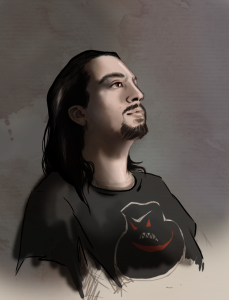
First, for any of our readers who might not be familiar with your work, could you please tell us a bit about yourself, where you work and what games you’ve worked on?

My name’s Leonard Balsera, and I’ve been a pen for hire in the RPG industry since about 2007, though I started working on my first projects as early as 2003.
The bulk of what I’m known for is my work with Evil Hat Productions, notably as a designer/developer/writer on their Fate system games: Spirit of the Century, The Dresden Files RPG, and Fate Core. I’ve helped with development work on some of Evil Hat’s Adventures and Worlds material for Fate, as well as developing Fate material for third parties, like Atomic Overmind Press. I’ve also written adventures for two of Pelgrane Press’ Gumshoe system games, done setting material for Mage: The Ascension from Onyx Path Publishing, done system development for Margaret Weis Productions’ Cortex Plus Hacker’s Guide, worked on a smattering of other small press game projects, done a little bit of podcast hosting, and basically just tried to worm my way into as many sectors of hobby gaming as possible.
Most recently, I wrote one of the chapters and some setting material for Wil Wheaton’s project with Green Ronin, called Titansgrave: The Ashes of Valkana.
I’m an advisor to Protagonist Labs (creators of Storium) on their educational project, cleverly called Storium for Schools, and am participating in some early alpha testing with them.
By day, I am the translation licensing administrator for Steve Jackson Games, helping our lovely, numerous partners in non-English markets across the world get what they need to do translated version of games like Munchkin, Chez Geek, and GURPS. I’m also the line editor for Chez Geek.
Yes. I’ve designed an accessory and expansion for Munchkin Zombies, and wrote an expansion for Chez Geek called Slack to the Future. There are rumors that I helped in the development of Hipster Dice, but frankly, by the time I’d heard of it, it was already super mainstream.
What is a typical day at work like for you?
Crowded, as you might imagine.
Is there any one particular project that stands out to you as your favorite?
Right now, my current favorite is probably Katanas & Trenchcoats, which my friend Ryan Macklin asked me to help him with. It’s a sendup of Highlander and the World of Darkness, but done from a place of love rather than a place of cynicism. We donated profits to the Seattle Children’s Hospital, which was super cool.
Some of your most well known work is the Dresden Files RPG. If you could take any other IP and develop a gaming system around it, what would it be?
I’d love to take a crack at Assassin’s Creed someday.
We recently did a special spotlight week on Miniatures on d20 Radio. Do you use Miniatures when your run RPGs or do you prefer the “theater of the mind” approach?
I tend not to use minis very often, mostly because I tend to design and play with systems where continual mini-retcons of who’s standing where in order to create dramatic moments is pretty much par for the course.
What is your favorite RPG system (excluding ones you’ve personally worked on)?
I don’t know if I can answer that with one game – like, at the risk of coming across as pretentious, my whole philosophy of the hobby rejects the idea of favorites, in favor of matching the best toolset to the job at hand. We’re at a great moment in the hobby, where the amount of systems available to meet the variety of potential preferences for play is staggering.
I suppose, if I had to state a preference, that I favor systems that allow for a lot of extemporaneous narration and improv, give all participants a lot of room to impose truths on the story as you go, and grant those truths some mechanical heft. Narrative significance outweighing pseudo-physics, kind of stuff.
The most extreme example of this is maybe Primetime Adventures. A lot of Vincent Baker’s stuff falls in that category, too – Dogs in the Vineyard, Apocalypse World and its many descendants, etc. Chad Underkoffler’s PDQ games.
I did work on a Cortex Plus book, but I can tell you that when I’m futzing around with hacks and stuff, I’ll probably try and represent an idea in Cortex Plus before moving to any other system. I think that, pound for pound, it handles modularity like nothing else.
For one-offs, Fiasco and Swords Without Master are my current two favorites. On the more “classic” side of the equation, D&D5 is a stellar combination of long-established hobby aesthetics and newer lessons. Green Ronin’s AGE system, the one that powers Dragon Age, also stands out in this regard.
For nostalgia: oWoD, Star Wars d6, Over the Edge, Cyberpunk 2020, Feng Shui. The 90s were a golden time for me, gaming-wise.If I had to choose a licensed game, probably Last Unicorn’s run on Star Trek.
For setting, Contested Ground Studios’ a/state. There is a campaign on nearly every damn page of that book.
One question some of our readers have had involve how to introduce FATE’s Aspect system to new players. Any advice you have for GM’s on this?
I find that one good fight where the GM telegraphs their own fate point spending, and their own use of advantages, is probably the single most useful tool, especially if it allows those NPCs to just own a PC’s day. No one likes getting their ass kicked, so as soon as it turns against them, a lot of people are very likely to wake up and go, “Oh, hold on, I can use these phrases on my sheet for bonuses too,” and start narrating away.
Unless you’re a jerk about it. Don’t be a jerk. Be helpful, at every turn. “Hey, you can get these sweet bonuses too, you know. Can you think of any way your aspects would help you? Do you want some suggestions?”
Beyond that, I’m not sure there’s any magic trick to it. Patience and empathy wins the day, same as when you’re learning just about anything. It’s a system that takes time to internalize and become skilled at using. Let it take time. It’s okay if a fight scene takes an hour, if everyone gets some good experience fooling around with aspects out of it.
Also, remember that Fate privileges shared endeavor. Learning to use aspects should not be every player having a disconnected conversation with the GM. Open the floor to suggestions from everyone, on invoking and compelling aspects.
Any words of advice for anyone who might be looking to get into RPG design?
A grab-bag:
- Put in the 10,000 hours, as often or as little as you can. Play everything. Run everything. Read everything. Tear apart the systems you know and like, as if they’re Legos, and build them back together again. Learn why things work as they do, instead of why you think they do. Especially, learn why games you don’t like work for other people. Learn game theory. Some of it will resonate, and some of it will feel like BS.
- Just write stuff. Fill your Google Docs. That stuff will probably suck. Let it suck. That’s okay. Failure is the best teacher. Make more things, or remake that thing, and do better next time. One of those next times will be a great thing.
- Go after big goals a piece at a time. Make an NPC, then a monster, then an encounter, then an adventure, then a campaign. Tweak a rule, then tweak a subset of rules, then make a new subset of rules, then make a supplement, then make a game.
- Listen to people who know stuff. Especially listen to people that you don’t agree with who know stuff. Do what they say anyway, every once in a while, just to see what happens. Get a second, or third, or fourth pair of eyes on everything you do. Humble yourself before the advice of others, but don’t let anyone make your stuff for you.
- Don’t feel like you have to go pro or full-time, ever. It can be a rough business. Be really honest with yourself about your goals and desires, and ask yourself hard questions about that on a fairly regular basis.
- When getting started, look for whatever you can provide of value to the community centered around a particular game you like. It’s a great way to get known, and it’s a great way to get willing guinea pigs for whatever you make.
- That said, when you approach or are approached by a company, don’t work for free. Ever. Exposure is a scam.
- When networking, be nice and don’t demand people’s time. People are busy. Ask instead, and express gratitude.
- If you’re going to ask someone to look at your work, have something fairly complete to show them. If you don’t really have anything to show, they’ll remember that more than they’ll remember your cool ideas.
Generally, publishers in our industry value reliability and timeliness over raw ability. You don’t have to be the best. You have to be good enough on time. That isn’t an excuse not to try your best, but it is an indicator of when you need to stop trying to perfect things.
Do you have any parting thoughts for our readers?
Thanks for letting me ramble. I’m grateful for the opportunity, always, and for all the support I get from folks out in the wide, wide world.
Thank you Leonard Balsera for giving us some of your very busy schedule and giving us an insight into your work!
